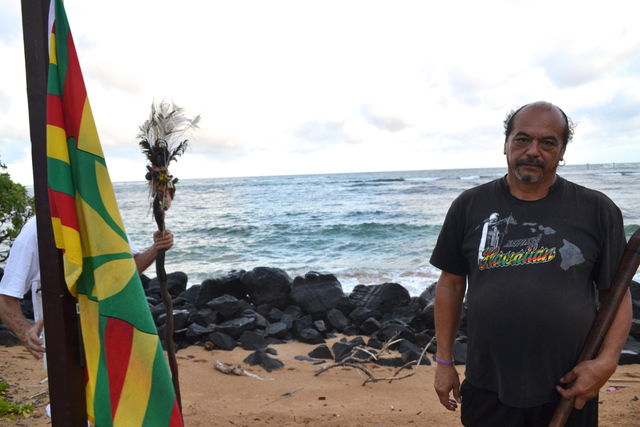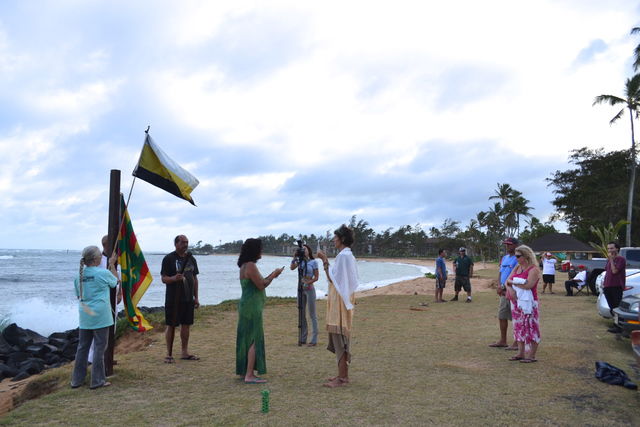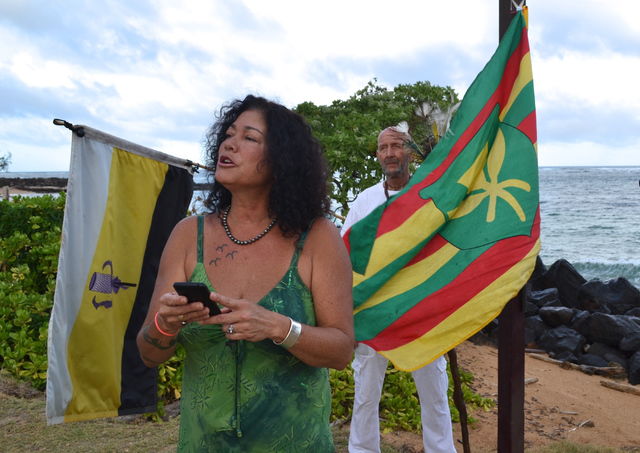KAPAA — Kaiulani Mahuka said the Hawaiian people won’t settle for anything less than full sovereignty. “We’re the sovereign Hawaiian nation. Federal recognition will never be anything to the Hawaiian people,” Mahuka said. “We want our country back. Overwhelmingly, the
KAPAA — Kaiulani Mahuka said the Hawaiian people won’t settle for anything less than full sovereignty.
“We’re the sovereign Hawaiian nation. Federal recognition will never be anything to the Hawaiian people,” Mahuka said. “We want our country back. Overwhelmingly, the Hawaiian people have said no. We don’t want to be federally recognized. Why should we?”
The host of the local radio program “Songs of Sovereignty” was among about 20 people at Kapaa Beach park protesting the U.S. Department of the Interior’s announcement Friday that finalized a rule for creating a government-to-government relationship with Native Hawaiians and the United States.
The rule would leave the Hawaiian community with the authority to reorganize its governing entity.
Supporters of the Interior Department’s rule included elected leaders.
“This is an historic step towards doing what is right and just for Native Hawaiians,” said Sen. Brian Schatz in a statement Friday.
But Mahuka said the DOI rule is, in fact, invalid since the U.S. did not officially annex Hawaii.
“It’s completely illegal. It’s a war crime. The biggest problem they have is there’s no treaty of annexation,” said Mahuka, one of the organizers of the protest. “That’s what they should of had to properly annex Hawaii to the United States, but no such treaty exists.”
Instead of a treaty of annexation, the U.S. annexed Hawaii by a joint resolution, known as the Newlands Resolution, on July 7, 1898.
“We’re not part of America. The Kingdom of Hawaii has been been recognized by the league of nations as its own country,” said Puanani Rogers, founder of Hookipa Network and co-organizer of the protest. “The United States has no jurisdiction over us because their resolution only went to the voters of their own lands.”
Joseph Kekauliki Kamai, who was among the protesters, said he has been protesting since 1975.
“We’re internationally recognized and now the U.S. is trying to recognize federally, trying to turn us into a tribe. We’re not a tribe. We’re a country,” he said.
Former U.S. Sen. Daniel Akaka spent about a dozen years trying to get a bill passed that would give Native Hawaiians the same rights already extended to many Native Americans and Alaska Natives. Efforts to get the bill to a vote have consistently been blocked, and Akaka retired three years ago.
Native Hawaiians have not had a formal, unified government since the overthrow of the Hawaiian kingdom in 1893.
Critics say it won’t right the wrongs of the overthrow and that it’s meant to turn Native Hawaiians into Indian tribes. Some Native Hawaiians say it can’t be assumed that all indigenous people share the same history, experiences and needs.
Many Native Hawaiians have long been clamoring for self-determination, but there are varying opinions of what that would look like, including federal recognition, restoring the overthrown Hawaiian kingdom or dual citizenship.
Rep. Tulsi Gabbard said the Native Hawaiian community has fought for the same rights and treatment as indigenous groups across the United States, like Native American tribes and Alaska Natives.
“I had the great honor of working as a legislative aide to Senator Akaka, who dedicated so much of his life to creating this opportunity for our Native Hawaiian community,” Gabbard said Friday. “I look forward to continuing to engage and work alongside our Native Hawaiian brothers and sisters as they determine their path forward.”
Native Hawaiians are the largest indigenous group in the U.S. that has not been offered the chance for a relationship with the federal government, said Kris Sarri, the Interior Department’s principal deputy assistant secretary for policy management and budget.
“Issues around the Native Hawaiian community itself organizing, making a decision to form a government … that is something really for the community to make decisions about,” she said. “All we wanted to do was make sure if they wanted to pursue those options, there was an option for a government-to-government relationship.”
The final federal rule mirrors a proposal announced a year ago and sets an administrative procedure that Interior would follow if an established Native Hawaiian government wants those ties.
It requires there be a governing document that undergoes a ratification vote by Native Hawaiians. An attempt last year to hold an election to select delegates for a constitutional convention fell apart after a lawsuit challenged the legality of holding a race-based election.
It’s not clear how the ratification requirement would be met. That’s for Native Hawaiians to figure out, Sarri said.
•••
The Associated Press contributed to this story.




